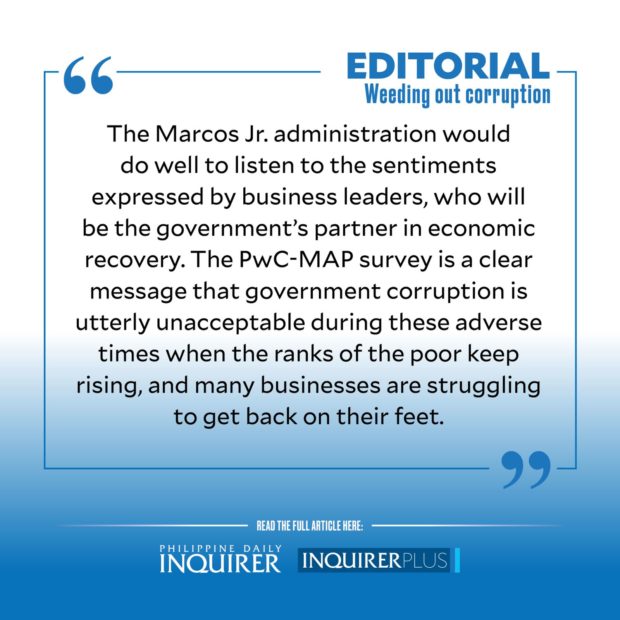Weeding out corruption
In a recent survey among the country’s top business executives, corruption was identified as the biggest barrier to our economic recovery from the pandemic and the top concern that the government must address.
In a 2022 CEO survey conducted from July to August this year by the PricewaterhouseCoopers (PwC) Philippines and the Management Association of the Philippines (MAP), 67 percent of 119 business leaders ranked corruption as the No. 1 economic obstacle.
Corruption outranked other pressing problems such as lower foreign and domestic investments (38 percent); political uncertainty (30 percent); uncontrolled inflation (29 percent); rising oil prices (28 percent), and lower quality of education (27 percent).
These and other issues like the Russia-Ukraine conflict and higher inflation and fuel costs were giving Philippine business leaders sleepless nights, said Mary Jade T. Roxas-Divinagracia, PwC Philippines deals and corporate finance manager.
The pessimism was evident in 52 percent of respondents who said it will take more than two years for the country’s economy to recover from the pandemic, in contrast to projections by economic managers that recovery will happen this year.
The respondents specifically identified corruption in the handling of pandemic funds under the Duterte administration.
“In the past three years, issues such as undocumented health spending, misallocated health care funds, and procurement of outdated equipment surfaced and have not been resolved,” according to the survey briefer.
The respondents were apparently referring to the underfunded Pharmally Pharmaceutical Corp., linked to President Duterte’s Chinese adviser Michael Yang, which was accused of overpriced, substandard, or undelivered pandemic supplies, as well as the Department of Education’s purchase in 2021 of overpriced but outdated laptops for public school teachers worth P2.4 billion.
Pharmally cornered almost P11 billion in pandemic contracts, some of which came from then Health Secretary Francisco Duque III’s dubious transfer of P42 billion to the controversial Procurement Service of the Department of Budget and Management (PS-DBM). A scathing report by the Senate implicating Duque and President Duterte did not pass after the latter’s allies refused to sign the report.
There has also been no transparent accounting of the billions set aside under two Bayanihan laws (around P602 billion for Bayanihan 1 and P569 billion for Bayanihan 2) for the pandemic response, as well as the massive foreign borrowings that the Duterte administration incurred.
Not that corruption is new in the Philippines, which slid down in Transparency International’s global corruption index in 2021, ranking 117th out of 180 countries, two notches below its 2020 ranking.
The cost of corruption is mind-boggling. In 2019, Deputy Ombudsman Cyril Ramos estimated that the country was losing P700 billion every year to corruption, making the Philippines the sixth most corrupt nation in the Asia Pacific.
This staggering amount is equal to some 20 percent of the annual government budget, and could have purchased 1.4 million housing units for the poor, provide assistance for around 7 million Filipinos, and a buffer stock of rice good for a year, Ramos said
It was thus a disappointment for many that President Marcos Jr. did not mention corruption, nor how his administration would tackle it, in his first State of the Nation Address in July. This early, the problem has reared its head anew, with the sugar importation mess leading to the resignation of the President’s chief of staff at the Department of Agriculture and his “Little President,” Executive Secretary Victor Rodriguez.
But such symbolic gesture and rhetoric are not enough. After all, Rodrigo Duterte failed miserably when he promised “not even a whiff” of corruption will happen during his watch, with his administration embroiled in the biggest corruption scandal during the pandemic. The Marcos Jr. administration would do well to listen to the sentiments expressed by business leaders, who will be the government’s partner in economic recovery. The PwC-MAP survey is a clear message that government corruption is utterly unacceptable during these adverse times when the ranks of the poor keep rising, and many businesses are struggling to get back on their feet.
The new government should demonstrate that it will brook no corruption by holding to account individuals involved in graft and other anomalies, even if they are allies. The President’s tremendous political capital must be put to good use in cleaning up the traditional corruption hotspots in the bureaucracy—the internal revenue, customs, public works, immigration, budget, and justice departments. Beyond expressing concern about the problem, the private sector must similarly do its part in curbing corruption in its ranks, with bribery and commissions for government contracts being open secrets.
Corruption has blocked our progress as a nation for far too long. It’s time to make its eradication an urgent national undertaking.





















